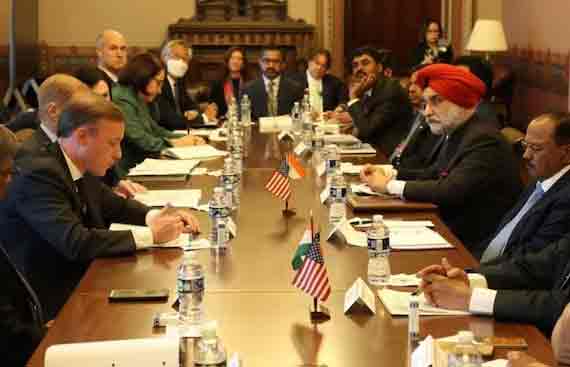ICET the Next Big Step in the India-US Relationship

ICET is, arguably, the next big thing, for the political, strategic, commercial, and scientific alignment it represents between the two countries.
Ajit Doval, the national security adviser of India, and Jake Sullivan, the national security adviser of the United States (US), will meet for the first high-level dialogue of the Initiative on Critical and Emerging Technologies (ICET). They may have finally discovered the solution to the mystery that has baffled observers of the relationship since the 2008 nuclear deal. ICET represents a positive alignment between the two nations on many levels, including political, geopolitical, commercial, and scientific.
It is the result of advanced political knowledge. The national security councils of both nations oversee it. It explicitly addresses the disruptive areas that will be crucial to both the coming Industrial Revolution and future conflict. It might make it possible for the US to lift its current export control limits. Additionally, it encourages both nations' corporate sectors to work together in delicate areas and capitalize on their complementary strengths.
In addition, it proves that both countries, particularly the White House, are committed to building a reliable ecosystem around technologies that will control the future. Both national security establishments are essentially saying that the relationship is impervious to friction and disagreements; that this is a long game and challenges will be overcome; and that it is indeed time to move past the hesitations of history, to use Prime Minister Narendra Modi's moving phrase to the US Congress.
The next stage in strategic partnership (NSSP), a signed agreement between the two nations in 2004, is comparable to ICET in that regard. If that agreement signaled the beginning of political and strategic convergence, ICET is a significant advancement. ICET can create doors for cooperation in advanced telecom, artificial intelligence, quantum, space, defense innovation, and semiconductors, just as that had opened up new avenues of cooperation in difficult fields like nuclear that had previously been inconceivable in the partnership. Additionally, ICET can bind India and the US into an industrial and military alliance fueled by high technology if NSSP ultimately opened the way for the nuclear agreement.
The political agreement signed by President Joe Biden and Prime Minister Narendra Modi in Tokyo in May 2022 led to the creation of ICET. National Security Council, ICET would create stronger links between the governments, academia, and industry of the two countries in a range of fields such as artificial intelligence, quantum computing, 5G/6G, biotechnology, and semiconductors. The leaders welcomed the formation of a United States-India Initiative on Critical and Emerging Technologies (ICET), spearheaded by the National Security Councils of the two nations to strengthen engagement in critical and emerging technologies.
Furthermore, there is a compelling argument for convergence in other tech fields. AI has already changed how people live, work, travel, vacation, do business, write, and even fall in love. The size of computation may alter as a result of quantum research, making current technology seem archaic. All future business and military operations will take place in space. The future of battle is in defense innovation, and discussion is needed to address US concerns about Indian interoperability and Indian concerns about American unwillingness to let go of the past and insistence on co-production and co-development. Land, ocean, air, and cyberspace will continue to be the theatres of conflict, as Ukraine has demonstrated. Add to it the clean energy component supply chain, which is not currently a topic of discussion but will determine who has the upper hand in addressing the existential conflict of the future.
